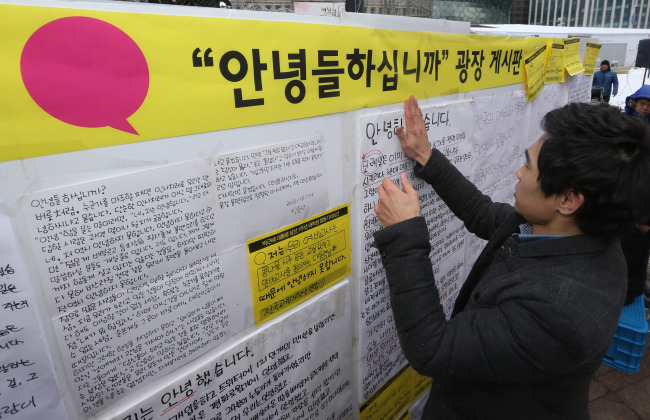How are you, really?
College students spread statements on posters
By Korea HeraldPublished : Dec. 19, 2013 - 20:23

A seemingly apolitical statement turned out to be anything but apolitical.
At first, “How are you?” was all that he asked. But the question begged an answer by provoking thousands, if not millions, into discussing what exactly is wrong with Korea today.
In less than a week, it became a national catchphrase for voicing social discontent.
Joo Hyun-woo, a business major at Korea University, posted the essay next to the school’s College of Political Science & Economics building on Dec. 10.
It was like any other “daejabo” ― one of the hundreds of handwritten posters that not too many students cared to stop and read.
Yet his piece inspired a swift torrent of similar postings nationwide on school campuses, on the streets, on social networking sites and even at the National Assembly, all copying his title: “How are you?”
In the message, Joo discussed some of the nation’s most controversial issues, such as the ongoing railway strike and the debate over privatizing healthcare.
All Joo had intended though was to raise awareness among his fellow 20-somethings who were more concerned with their personal security than society and collective justice.
“I just wanted to ask,” wrote Joo, “if you were doing fine because these problems are not yours, and because you reserve the right to remain politically aloof.”
He never expected his text to spark a sociopolitical debate, involving students, politicians, academics and activists of all ages.
Similar essays popped up on campuses countrywide, with students using the “How are you?” catchphrase to answer Joo’s call.
Politicians as prominent as ruling Saenuri Party Rep. Kim Moo-sung, a close associate of President Park Geun-hye, borrowed the “How are you?” phrase to spice up their opinions.
Even K-pop star Jong-hyun of the boy band SHINee used one of the “How are you?” daejabos as his profile picture on the social networking site Twitter, igniting an online battle between his diehard fans and members of the conservative online community “Daily Best,” or “Ilbe.”
Joo’s message continued to reverberate on Thursday, the first anniversary of President Park Geun-hye’s election, when about 30 progressive student and civic groups expressed their support for the daejabo movement in a news conference at Seoul Station.
“Through daejabo citizens began to ask each other whether justice and democracy are alive in our society and to say that, no, they weren’t fine,” they said in a statement.
It was as if Joo’s words had catapulted the daejabo back to their former place of glory in Korea during the 1980s, when the hand-written posters were rallying points for student protests against the military-backed dictatorship.
“I think Joo’s words, in a way, caused ripples amongst us (college students), maybe because, or maybe not because, we had become somewhat ignorant of our society,” said Baik Sang-jin, a student at Seoul National University’s School of Law.
Over 60 daejabos were posted next to Joo’s original on Korea University’s campus as of Tuesday, although not all featured remarks that chimed with Joo’s.
Students from the right-leaning Korea University Students Forum (not affiliated with KU), for instance, wrote a parody daejabo that lampooned Joo’s original question with the title, “How could we be fine considering the current state of affairs?”.
“How could we be fine, Mr. Joo, when North Korea is getting ready to strike again?” the statement read, referring to the decades-old debate over whether South Korean liberals are North Korea sympathizers. Some called Joo a communist in disguise, and said he was attempting to mobilize citizens for a dangerous cause.
But what is important, according to one student, is not who is right or wrong, but that Joo’s words have initiated a social conversation.
“I think that Joo had maybe intended for this kind of thing to happen,” said Hwang Jeong-hoon, a senior majoring in journalism at the Hankuk University of Foreign Studies.
“I think it is very positive that this kind of conversation, you know, is going on. It’s not about whether you’re a conservative or a liberal.”
By Jeong Hunny (hj257@heraldcorp.com)
-
Articles by Korea Herald



![[AtoZ Korean Mind] Does your job define who you are? Should it?](http://res.heraldm.com/phpwas/restmb_idxmake.php?idx=644&simg=/content/image/2024/05/06/20240506050099_0.jpg&u=)















![[K-pop's dilemma] Is Hybe-Ador conflict a case of growing pains?](http://res.heraldm.com/phpwas/restmb_idxmake.php?idx=642&simg=/content/image/2024/05/07/20240507050746_0.jpg&u=)